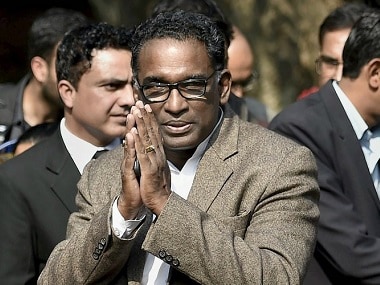Supreme Court judge Justice Jasti Chelameswar on Thursday refused to hear a plea of former law minister Shanti Bhushan against the authority of the CJI as a master of roster.
"I would not like to deal with Bhushan's plea, reasons for it are too obvious," Chelameswar, the senior-most Supreme Court judge after the CJI, told Shanti Bhushan's son and advocate Prashant.
Prashant mentioned the matter before Chelameswar on Thursday and said this was an emergency situation. He said he was referring the matter to Chelameswar's bench as the PIL challenges the master of roster concept and CJI Dipak Misra cannot deal with it.
"Someone is running a relentless tirade against me that I am up to grab something," Chelameswar said, adding that he would not want another reversal of his order in the next 24 hours. "This country will follow its own course but I'm sorry and I can't deal with this PIL," he said.
Denied urgent listing of his father's PIL, Prashant then rushed to Misra's court and mentioned the matter for listing expeditiously. The bench, headed by CJI said, "We will look into it."
The developments come a day after a bench comprising Misra, Justice AM Khanwilkar and Justice DY Chandrachud dismissed a PIL filed by Lucknow resident Ashok Pande, seeking the framing of guidelines for allocation of cases. The Supreme Court called the petition "scandalous" and ruled that the CJI is an institution himself and cannot be distrusted.
At an event on 7 April, Chelameswar had said that the allocation of important and sensitive cases to different benches should be done transparently and not in an arbitrary manner. "We are not questioning his (CJI Dipak Misra) authority as master of roster but it should not be exercised in an arbitrary manner but in a transparent manner," Chelameswar had said.
Bhushan had moved the apex court on 6 April seeking direction that the exercise of authority as a master of roster by the CJI in allocating the cases to different benches should be done in consultation with senior judges who are part of top court collegium.
In his PIL, Bhushan said that the authority of the CJI as a master of roster is not an "absolute, arbitrary, singular power" which may be exercised in his "sole discretion" and the CJI "must" exercise his authority in consultation with other senior judges who are also part of the collegium.
"Underlying principle of the collegium is that the collective opinion of a collegium of senior judges is much safer than the opinion of the CJI alone," the PIL said.
Bhushan has contended that the master of roster "cannot be unguided and unbridled discretionary power, exercised arbitrarily by the... CJI, by hand-picking benches of select judges or by assigning cases to particular Judges".
Any such power or its exercise, the petition said, would result in "a subversion of democracy and the rule of law as guaranteed under Article 14 of the Constitution".
Pointing to "extremely disturbing trend" of listing matters "subjectively and selectively" only before certain benches, the PIL said that the trend reflects "serious erosion of the independence of the Judiciary" by resorting to the method of "favoured listings".
"As a result, justice appears to be skewed and in many cases, justice may even stand denied," it said.
It said that the powers being exercised by the CJI and the concerned registry officials clearly reflect a "pattern of favouritism, nepotism and forum shopping".
Recounting the cases that came up before certain benches of the top court in recent months, the PIL said that the "pattern also suggests that certain matters which are politically sensitive and involve either Ruling Party Leaders and/or Opposition Party Leaders are assigned only to certain Benches".
Though the listing of politically sensitive matters appears to be "routine", they seem designed in a particular direction to exclude other benches from hearing them, it said.
Describing such selective listing as "unwarranted and unjustified", the PIL claimed that "such listings and/or allocations are not happening on account of computer allocation but appears due to human interference in the system".
With inputs from agencies
Updated Date: Apr 12, 2018 12:46 PM
